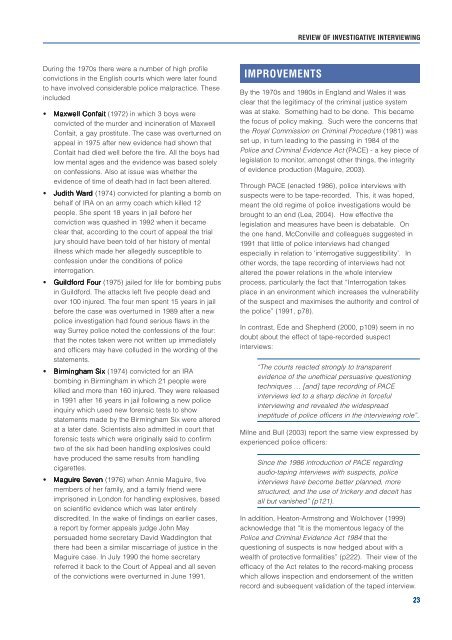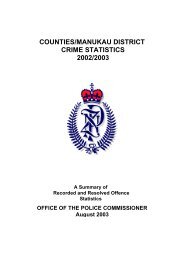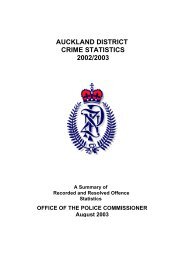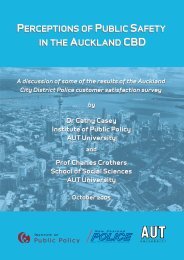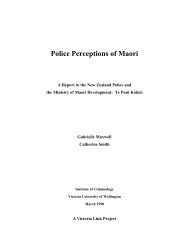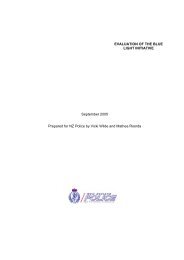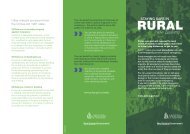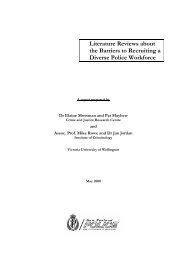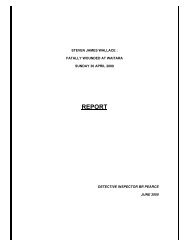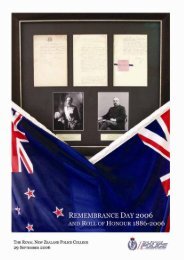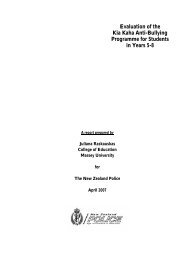Investigative interviewing: the literature - New Zealand Police
Investigative interviewing: the literature - New Zealand Police
Investigative interviewing: the literature - New Zealand Police
Create successful ePaper yourself
Turn your PDF publications into a flip-book with our unique Google optimized e-Paper software.
REVIEW OF INVESTIGATIVE INTERVIEWING<br />
During <strong>the</strong> 1970s <strong>the</strong>re were a number of high profile<br />
convictions in <strong>the</strong> English courts which were later found<br />
to have involved considerable police malpractice. These<br />
included<br />
• Maxwell Confait (1972) in which 3 boys were<br />
convicted of <strong>the</strong> murder and incineration of Maxwell<br />
Confait, a gay prostitute. The case was overturned on<br />
appeal in 1975 after new evidence had shown that<br />
Confait had died well before <strong>the</strong> fire. All <strong>the</strong> boys had<br />
low mental ages and <strong>the</strong> evidence was based solely<br />
on confessions. Also at issue was whe<strong>the</strong>r <strong>the</strong><br />
evidence of time of death had in fact been altered.<br />
• Judith War<br />
ard (1974) convicted for planting a bomb on<br />
behalf of IRA on an army coach which killed 12<br />
people. She spent 18 years in jail before her<br />
conviction was quashed in 1992 when it became<br />
clear that, according to <strong>the</strong> court of appeal <strong>the</strong> trial<br />
jury should have been told of her history of mental<br />
illness which made her allegedly susceptible to<br />
confession under <strong>the</strong> conditions of police<br />
interrogation.<br />
• Guildford d Four (1975) jailed for life for bombing pubs<br />
in Guildford. The attacks left five people dead and<br />
over 100 injured. The four men spent 15 years in jail<br />
before <strong>the</strong> case was overturned in 1989 after a new<br />
police investigation had found serious flaws in <strong>the</strong><br />
way Surrey police noted <strong>the</strong> confessions of <strong>the</strong> four:<br />
that <strong>the</strong> notes taken were not written up immediately<br />
and officers may have colluded in <strong>the</strong> wording of <strong>the</strong><br />
statements.<br />
• Birmingham Six (1974) convicted for an IRA<br />
bombing in Birmingham in which 21 people were<br />
killed and more than 160 injured. They were released<br />
in 1991 after 16 years in jail following a new police<br />
inquiry which used new forensic tests to show<br />
statements made by <strong>the</strong> Birmingham Six were altered<br />
at a later date. Scientists also admitted in court that<br />
forensic tests which were originally said to confirm<br />
two of <strong>the</strong> six had been handling explosives could<br />
have produced <strong>the</strong> same results from handling<br />
cigarettes.<br />
• Maguire e Seven (1976) when Annie Maguire, five<br />
members of her family, and a family friend were<br />
imprisoned in London for handling explosives, based<br />
on scientific evidence which was later entirely<br />
discredited. In <strong>the</strong> wake of findings on earlier cases,<br />
a report by former appeals judge John May<br />
persuaded home secretary David Waddington that<br />
<strong>the</strong>re had been a similar miscarriage of justice in <strong>the</strong><br />
Maguire case. In July 1990 <strong>the</strong> home secretary<br />
referred it back to <strong>the</strong> Court of Appeal and all seven<br />
of <strong>the</strong> convictions were overturned in June 1991.<br />
IMPROVEMENTS<br />
By <strong>the</strong> 1970s and 1980s in England and Wales it was<br />
clear that <strong>the</strong> legitimacy of <strong>the</strong> criminal justice system<br />
was at stake. Something had to be done. This became<br />
<strong>the</strong> focus of policy making. Such were <strong>the</strong> concerns that<br />
<strong>the</strong> Royal Commission on Criminal Procedure (1981) was<br />
set up, in turn leading to <strong>the</strong> passing in 1984 of <strong>the</strong><br />
<strong>Police</strong> and Criminal Evidence Act (PACE) - a key piece of<br />
legislation to monitor, amongst o<strong>the</strong>r things, <strong>the</strong> integrity<br />
of evidence production (Maguire, 2003).<br />
Through PACE (enacted 1986), police interviews with<br />
suspects were to be tape-recorded. This, it was hoped,<br />
meant <strong>the</strong> old regime of police investigations would be<br />
brought to an end (Lea, 2004). How effective <strong>the</strong><br />
legislation and measures have been is debatable. On<br />
<strong>the</strong> one hand, McConville and colleagues suggested in<br />
1991 that little of police interviews had changed<br />
especially in relation to ‘interrogative suggestibility’. In<br />
o<strong>the</strong>r words, <strong>the</strong> tape recording of interviews had not<br />
altered <strong>the</strong> power relations in <strong>the</strong> whole interview<br />
process, particularly <strong>the</strong> fact that “Interrogation takes<br />
place in an environment which increases <strong>the</strong> vulnerability<br />
of <strong>the</strong> suspect and maximises <strong>the</strong> authority and control of<br />
<strong>the</strong> police” (1991, p78).<br />
In contrast, Ede and Shepherd (2000, p109) seem in no<br />
doubt about <strong>the</strong> effect of tape-recorded suspect<br />
interviews:<br />
“The courts reacted strongly to transparent<br />
evidence of <strong>the</strong> unethical persuasive questioning<br />
techniques … [and] tape recording of PACE<br />
interviews led to a sharp decline in forceful<br />
<strong>interviewing</strong> and revealed <strong>the</strong> widespread<br />
ineptitude of police officers in <strong>the</strong> <strong>interviewing</strong> role”.<br />
Milne and Bull (2003) report <strong>the</strong> same view expressed by<br />
experienced police officers:<br />
Since <strong>the</strong> 1986 introduction of PACE regarding<br />
audio-taping interviews with suspects, police<br />
interviews have become better planned, more<br />
structured, and <strong>the</strong> use of trickery and deceit has<br />
all but vanished” (p121).<br />
In addition, Heaton-Armstrong and Wolchover (1999)<br />
acknowledge that “It is <strong>the</strong> momentous legacy of <strong>the</strong><br />
<strong>Police</strong> and Criminal Evidence Act 1984 that <strong>the</strong><br />
questioning of suspects is now hedged about with a<br />
wealth of protective formalities” (p222). Their view of <strong>the</strong><br />
efficacy of <strong>the</strong> Act relates to <strong>the</strong> record-making process<br />
which allows inspection and endorsement of <strong>the</strong> written<br />
record and subsequent validation of <strong>the</strong> taped interview.<br />
23


